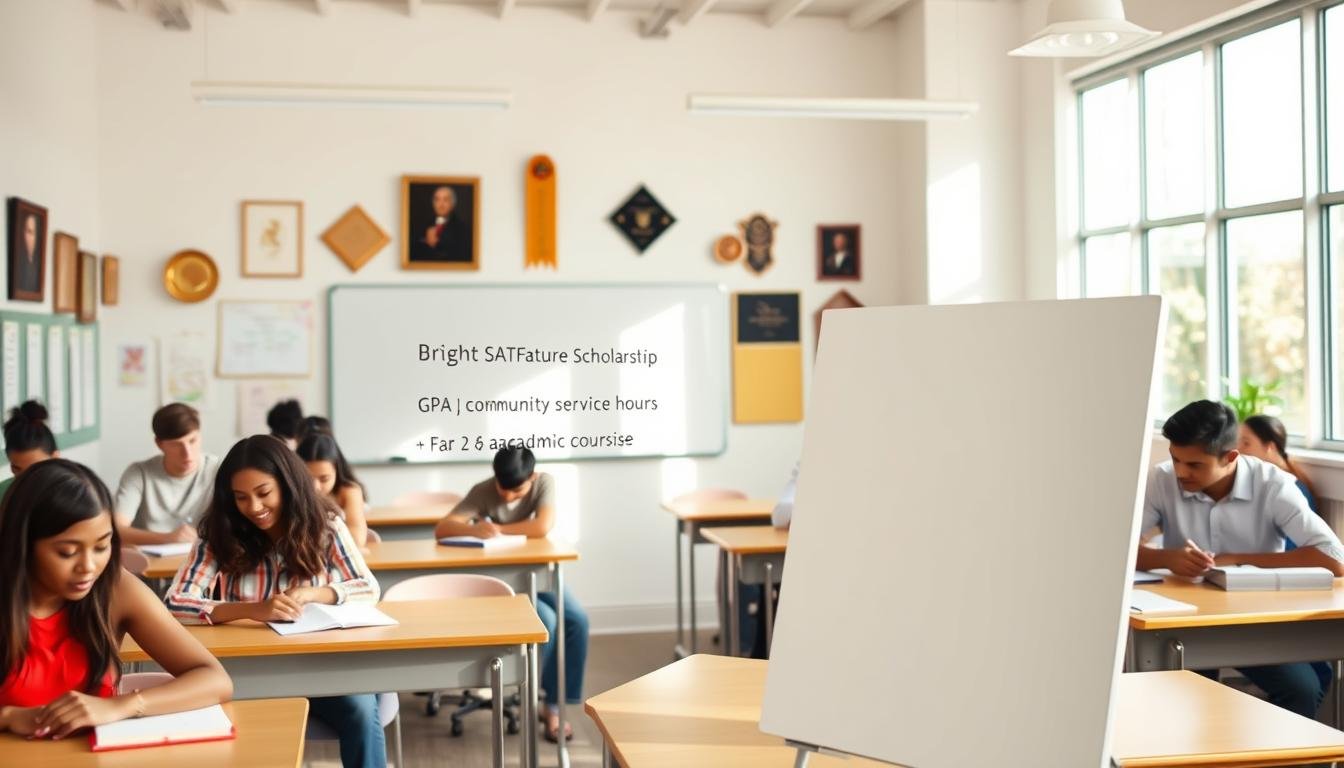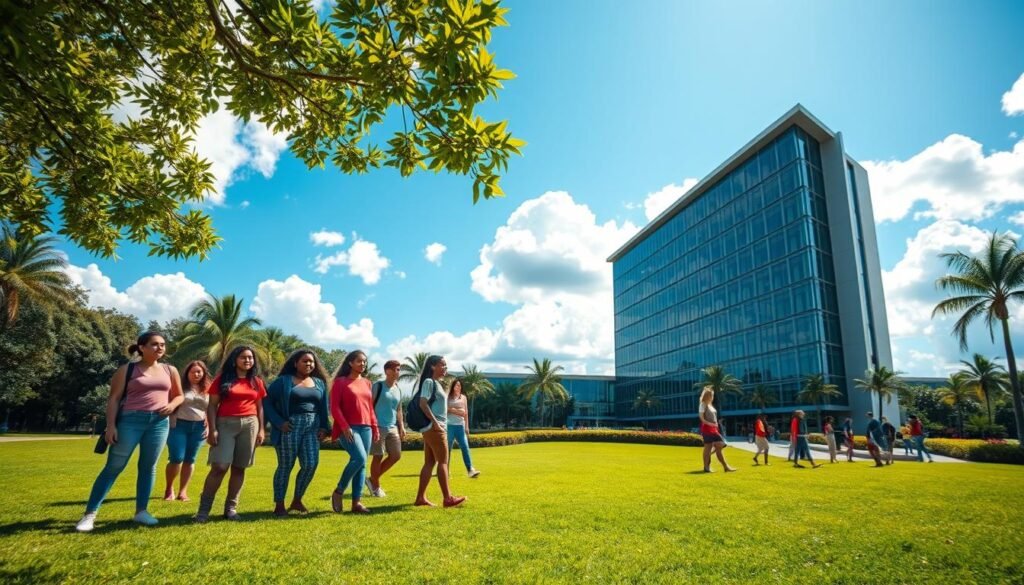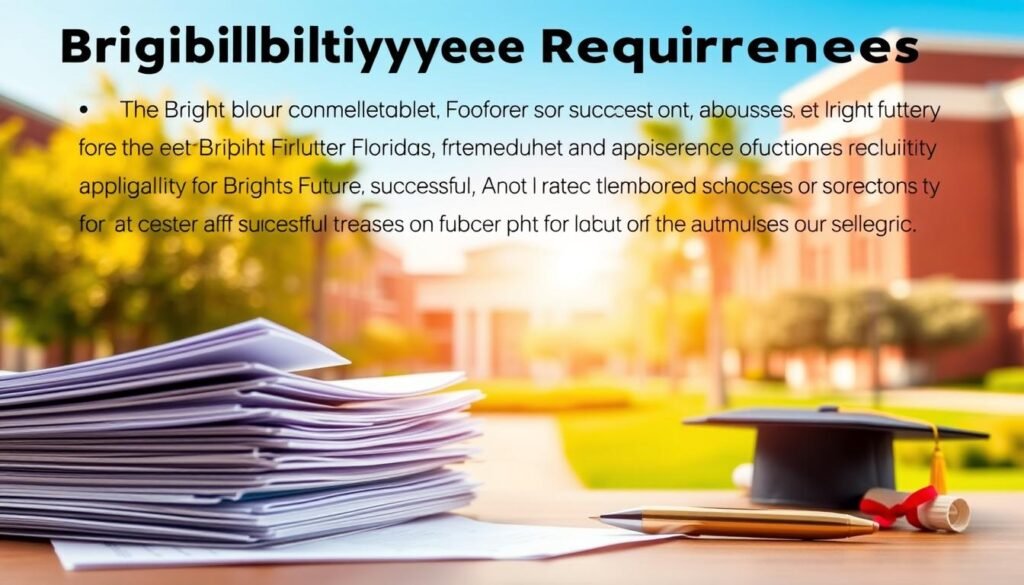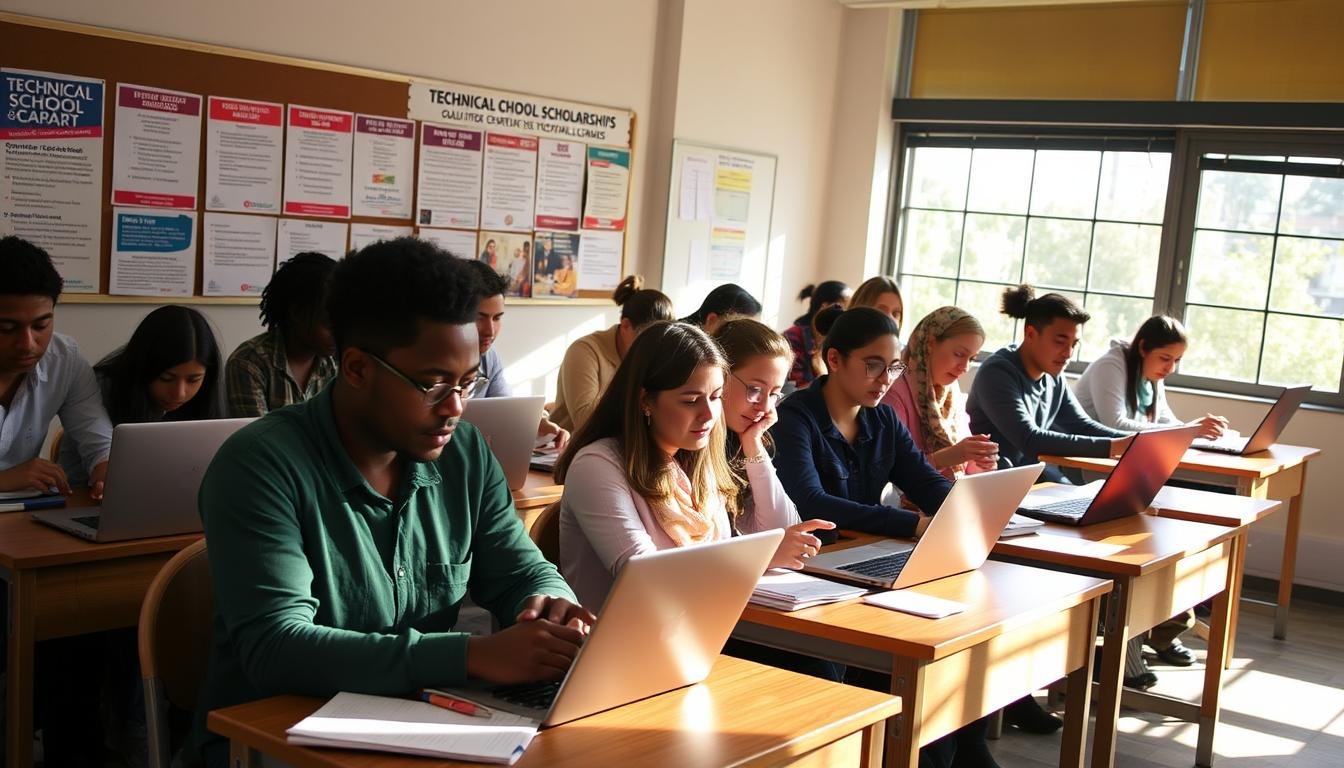What if a single opportunity could transform your academic journey and career path? For students in Florida, the Bright Futures Scholarship does just that. This merit-based program helps high-achieving learners pursue higher education with financial support.
Cecil Robinson, a former recipient, earned his Master’s degree at the University of West Florida without debt. His story shows how the program opens doors to internships and leadership roles. The initiative doesn’t just cover tuition—it builds futures.
Eligibility depends on grades, test scores, and community service. Both undergraduate and graduate students can qualify. With clear requirements, the process is straightforward for dedicated applicants.
Key Takeaways
- Florida’s top merit-based aid for high-performing students
- Covers tuition and reduces financial stress for families
- Supports career growth through internships and networking
- Rewards academic excellence and community involvement
- Available for multiple degree levels
What Is the Bright Futures Scholarship?
Florida students have a powerful tool to fund their education through a state-backed initiative. The Bright Futures Scholarship, managed by the Florida Department of Education, rewards academic excellence and community involvement. It’s designed to make college affordable while fostering future leaders.
Overview of the Program
This merit-based aid covers tuition and key fees at over 130 Florida institutions. Funded by the state lottery, it supports both public and private colleges. The program aligns with workforce development goals, similar to Colorado’s successful models.
Eligible fees include activity, health, and technology charges. Non-academic costs like housing or meal plans aren’t covered. Summer semesters qualify for funding, adding flexibility for students.
Types of Bright Futures Scholarships
Two award levels exist: Florida Academic Scholars (FAS) and Florida Medallion Scholars (FMS). FAS covers 100% of tuition, while FMS pays 75%. Both include specified fees and prioritize career-ready skills.
FAS requires higher GPA and test scores, reflecting its prestige. FMS offers substantial assistance for students with strong but slightly lower achievements. Both programs emphasize service hours, reinforcing community values.
Bright Futures Scholarship Eligibility Requirements
Meeting specific criteria is the first step toward securing this valuable financial aid. The program rewards students who demonstrate academic excellence and commitment to their community. Eligibility hinges on three pillars: grades, enrollment status, and Florida residency.
Academic and GPA Criteria
The Florida Academic Scholars (FAS) tier requires a 3.5 GPA for initial qualification. Renewal demands a 3.0 GPA each academic year. For the Florida Medallion tier, students need a 3.0 GPA initially and 2.75 to retain funding.
Falling below the renewal GPA triggers a one-term probation. If uncorrected, the award is revoked. SAT/ACT scores must align with state benchmarks—1290 SAT or 29 ACT for FAS.
Credit Hour and Enrollment Requirements
Full-time students must complete 12–15 credit hours per term. Only earned credits count—withdrawals or failures don’t qualify. Graduate students follow a 7-semester limit for baccalaureate programs.
Part-time enrollment reduces funding proportionally. Summer terms count toward annual credit hour minimums, offering flexibility.
Florida Residency and High School Graduation
Applicants must prove Florida residency for at least one year before graduation. Documents like voter registration or lease agreements verify status.
An accredited high school diploma or homeschool equivalent is mandatory. Homeschoolers submit portfolios reviewed by the state.
How to Apply for the Bright Futures Scholarship
Securing financial aid for college starts with a well-prepared application. Florida’s program streamlines the process but requires strict adherence to deadlines and documentation. Follow these steps to maximize approval chances.
Application Steps and Deadlines
Submit the Florida Financial Aid Application (FFAA) by August 31 after high school graduation. Late submissions face reduced funding. Test scores and transcripts must be sent directly from testing agencies and schools.
Track progress using the Bright Futures Status Check Form online. Missing documents trigger email alerts. Appeals for eligibility issues must be filed within 30 days.
Required Documentation
Gather proof of Florida residency, like a driver’s license or lease agreement. Official SAT/ACT scores and sealed transcripts are mandatory. Homeschoolers submit a state-reviewed portfolio.
Since 2023, FAFSA isn’t required. However, other financial aid programs may still need it. Verify credits and GPA through the automatic verification system.
Renewal and Maintenance
Keep a 3.0 GPA (FAS) or 2.75 (FMS) to retain funding. Dropped courses after the add/drop period require repayment. A $100 fee applies for late tuition payments.
Restore eligibility by completing summer courses to meet credit-hour minimums. The form for appeals requires detailed academic explanations and supporting evidence.
Bright Futures Award Details and Benefits
Understanding the financial benefits of this program helps students maximize their college funding. The award structure varies by tier, covering essential costs like tuition and approved fees. Here’s how to navigate the advantages.
Tuition and Fee Coverage (FAS vs. FMS)
The Florida Academic Scholars (FAS) tier pays 100% of tuition and fees for students taking 6+ credit hours. For a $3,000 semester bill, FAS covers the full amount.
Florida Medallion Scholars (FMS) funds 75%, leaving a $750 balance for the same term. Both tiers include activity, health, and technology fees. Disbursements take 3–4 weeks after enrollment verification.
Interaction with Florida Prepaid and Other Financial Aid
This aid works alongside Florida Prepaid plans. Prepaid funds apply first, reducing the scholarship’s taxable portion. Overpayments trigger refunds within 14 days.
Students can stack it with Pell Grants and federal loans. However, total aid cannot exceed the cost of attendance. Always check your school’s financial degree office for specifics.
Graduate Study Opportunities
Graduate funding is limited to 15 credit hours at undergraduate rates. For a 3-credit course costing $1,200, the award pays $900 (FMS) or $1,200 (FAS). Summer terms follow the same rules.
Note: Any remaining balance after Florida Prepaid and scholarship application becomes the student’s responsibility. Payment plans are available for uncovered costs.
Conclusion
Florida’s merit-based program offers a clear path to affordable education. With proper planning, students can earn a degree with minimal debt. Cecil’s success story proves how this assistance shapes careers.
Stay on track by monitoring deadlines and GPA requirements. Use the Credit Hour Interactive Tool to plan course loads efficiently. Summer terms provide flexibility to meet credit minimums.
Since 2010-11, the program has expanded support for graduate studies. High school counselors can guide applicants through the process. Take action now—your future in college starts with one application.
FAQ
What is the Bright Futures Scholarship?
It’s a merit-based financial aid program for Florida high school graduates. The Florida Department of Education offers awards to students pursuing higher education in-state.
What are the types of awards available?
There are two main tiers: the Florida Academic Scholars (FAS) and Florida Medallion Scholars (FMS). Each has different eligibility criteria and award amounts.
What GPA do I need to qualify?
FAS requires a 3.5 GPA, while FMS needs a 3.0. Weighted GPAs from high school are considered, along with test scores and service hours.
How many credit hours must I take to keep the award?
Full-time enrollment (12+ credits per term) is required. Part-time students may receive partial funding if enrolled in at least 6 credit hours.
Can I use it with Florida Prepaid or other aid?
Yes! The award covers tuition and fees not paid by other programs. Funds are applied after grants like Pell or state assistance.
When is the application deadline?
Submit the Florida Financial Aid Application (FFAA) by August 31 after high school graduation. Late submissions aren’t accepted.
Does it cover graduate studies?
No. The program supports only undergraduate degrees at eligible Florida colleges, universities, or career schools.
How do I renew the scholarship each year?
Maintain a minimum college GPA (3.0 for FAS, 2.75 for FMS) and complete 24 credit hours annually. Submit renewal requests through your school.








